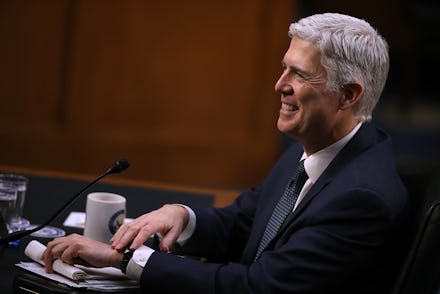Neil Gorsuch's views on abortion, immigration and gun control

After nearly 14 months, the Supreme Court of the United States' bench is now full once again, as Judge Neil Gorsuch was officially confirmed by the U.S. Senate on Friday.
Gorsuch's nomination will preserve the conservative majority that the court had before the February 2016 death of Justice Antonin Scalia, whom Gorsuch once praised as a "lion of the law."
But with a bevy of decisions concerning controversial topics awaiting him in the Supreme Court, how will Gorsuch rule? Here are Gorsuch's past opinions and decisions when it comes to three key topics: immigration, abortion and gun control.
Immigration
During his time as a judge in the 10th Circuit Court of Appeals, Gorsuch took a mixed view on immigration. FiveThirtyEight analyzed Gorsuch's immigration decisions and revealed the judge took a surprisingly moderate view, siding with immigrants in 10% of cases, as compared to the nine percent average among the circuit court's judges overall.
Some of Gorsuch's key decisions in the 10th circuit include the case Montano-Vega v. Holder, in which Gorsuch expressed sympathy for an undocumented immigrant with few options, and Alejandre-Gallegos v. Holder, in which Gorsuch ordered disciplinary proceedings against a lawyer for failing to do an adequate job of defending the immigrants he represented.
On the other hand, in Porro v. Barnes, involving an undocumented immigrant who had been illegally tased by his jailer, Gorsuch upheld the lower court's ruling that the jailer — but not the county or the sheriff — was liable.
In the case Gutierrez-Brizuela v. Lynch, which concerned an immigrant seeking lawful status, Gorsuch ruled against the immigration officials, using the case as a way to criticize the Chevron Deference, which gives the executive branch and federal agencies leeway to interpret the law.
"Chevron and Brand X permit executive bureaucracies to swallow huge amounts of core judicial and legislative power and concentrate federal power in a way that seems more than a little difficult to square with the Constitution of the framers' design," Gorsuch wrote in his opinion on the decision. "Maybe the time has come to face the behemoth."
Abortion and reproductive rights
Anti-abortion advocates have pointed to Gorsuch's 2006 book The Future of Assisted Suicide and Euthanasia to explain his anti-abortion stance. In the book, as quoted in the Denver Post, Gorsuch wrote "human life is fundamentally and inherently valuable, and that the intentional taking of human life by private persons is always wrong."
"It is impossible to come away from this rather remarkable book with any conclusion other than that this is a man who has a very high regard for the sanctity and the dignity of human life," Timothy Goeglein, vice president for external relations for the evangelical ministry Focus on the Family, told CNN.
A footnote in the book, however, suggests that Gorsuch didn't want his writing to take a stance on abortion, noting that he did not "seek here to engage the abortion debate."
"Abortion would be ruled out by the inviolability-of-life principle ... if, but only if, a fetus is considered a human life," the footnote, as quoted in the Denver Post, continued. "The Supreme Court in Roe [v. Wade], however, unequivocally held that a fetus is not a 'person' for purposes of constitutional law."
But Gorsuch's rulings haven't suggested the judge will be a champion for women's reproductive right. Most notably, in the 2013 case in Hobby Lobby Stores v. Sebelius, Gorsuch ruled in favor of the Christian-owned company Hobby Lobby, who asserted that the Affordable Care Act mandate requiring employer-provided health insurance plans to cover birth control and contraception violated the company's freedom of religion.
Gorsuch also sided against Planned Parenthood in the case Planned Parenthood Association of Utah v. Herbert, where Planned Parenthood sued to block the Utah governor's order to suspend its funding after videos alleging the organization sold fetal tissues were released. Though the 10th Circuit ultimately ruled in favor of Planned Parenthood, Gorsuch authored a dissenting opinion arguing the governor was lawful in blocking the group's funding.
"A deep dive into his record reveals a jarring pattern: Judge Gorsuch has repeatedly taken an activist approach to a woman's right to make her own decisions about her health," Sen. Tim Kaine of Virginia wrote in an opinion post for CNN.
Gun control
Gorsuch does not have an extensive record when it comes to gun control. As a federal judge, Gorsuch only ruled on one case directly concerning the Second Amendment. The court's decision in the 2012 case, U.S. v. Games-Perez, declared: "The Second Amendment protects an individual's right to own firearms and may not be infringed lightly." Gorsuch was one of three judges who presided over the case but did not write the decision.
UCLA School of Law professor Adam Winkler told CNN: "Although Gorsuch's exact views on the Second Amendment remain a mystery, several of his decisions made it harder to keep guns out of the hands of felons."
And while the full extent of Gorsuch's stance on gun control is not yet known, that isn't stopping the National Rifle Association from celebrating Gorsuch's spot on the Supreme Court bench.
"On behalf of our 5 million members, the NRA congratulates Neil Gorsuch on his confirmation to the U.S. Supreme Court," Chris W. Cox, executive director of the NRA Institute for Legislative Action, said in a statement following Gorsuch's confirmation. "Gorsuch is an excellent choice to fill the vacancy left by the passing of Justice Scalia."